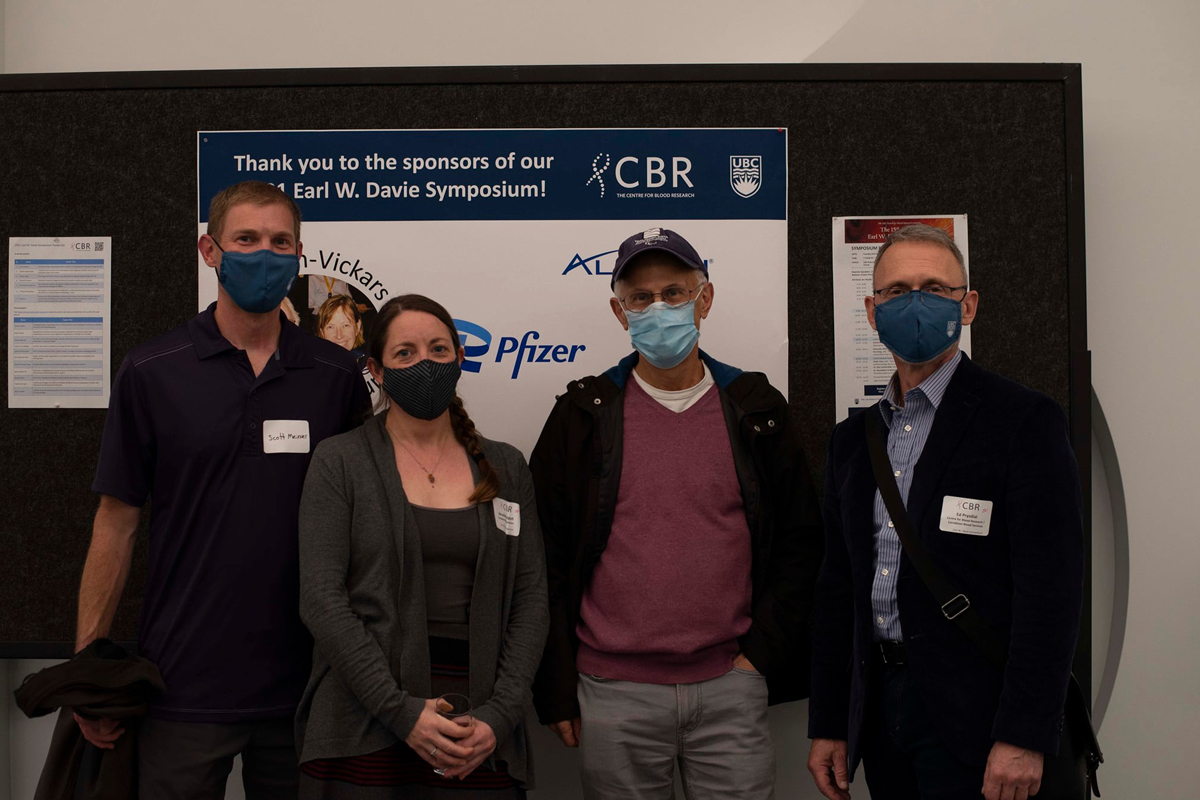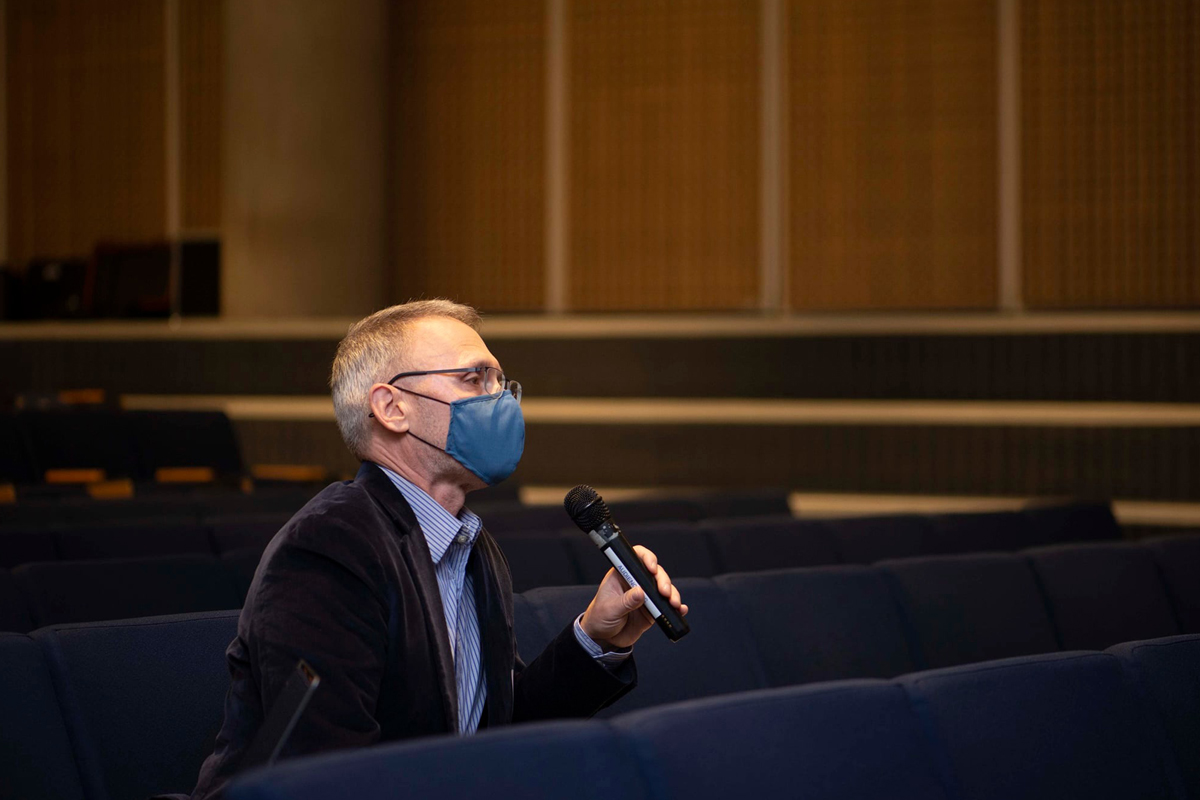Earl W. Davie Symposium 2021 – a welcome return to in-person for some

Hosted by the Centre for Blood Research (CBR), the 15th Earl W. Davie Symposium in early November 2021 was the first in-person professional event I have attended since late 2019. Arriving that morning at UBC Robson Square in Vancouver felt just like the numerous other CBR Symposia I’ve attended over the years. But the chance to see many dear colleagues in person—after almost two years of virtual interactions—added an extra layer of anticipation and excitement.
After a fully virtual event in 2020, the 2021 event was held in a hybrid format. A few dozen people attended in person, with some speakers presenting from the Robson Square venue. There was also an in-person poster session. But the event was fully accessible to virtual participants and attendees. Most of the speakers presented from elsewhere in Canada and the U.S., and poster presentations could be given virtually.

Canadian Blood Services senior research assistant, Scott Meixner, Canadian Blood Services knowledge broker, Dr. Geraldine Walsh, CBR principal investigator and Canadian Blood Services adjunct scientist, Dr. Ed Conway and CBR principal investigator and Canadian Blood Services senior scientist Dr. Ed Pryzdial at the 2021 Earl W. Davie Symposium. Photo by Kitty Liu and courtesy of the CBR.
Canadian Blood Services is proud to partner with the Centre for Blood Research to deliver training and education events including the annual Earl W. Davie Symposium.
Like other scientific meetings, the Earl W. Davie symposium is about sharing cutting-edge research. But it is also about connection and friendship. Running annually since 2007, this symposium honours Dr. Earl W. Davie, a preeminent researcher whose paradigm-shifting biochemical studies shed light on how blood clots. Earl was a great friend to the Centre for Blood Research. He was a mentor to many there, and he himself attended the symposium almost every year until his passing in 2020. At this year’s event, when a day together seems so special, I reflected on his contributions to so many previous events over the years and how lucky we were for his presence. He was truly inspirational.
The symposium carries on and reflects Earl’s remarkable legacy. It brings together researchers, doctors, nurses, industry members and varied health-care professionals with its exciting program centred around blood coagulation. To read more about the 2021 symposium, including a synopsis of presentations and poster prize winners, visit the Centre for Blood Research’s blog post “Earl W. Davie Symposium 2021: Fifteen years of scientific learning and opportunities”.

Dr. Ed Pryzdial (CBR principal investigator and Canadian Blood Services senior scientist) asks a question at the 2021 Earl W. Davie Symposium. Photo by Kitty Liu and courtesy of the CBR.
For me, a highlight of the 2021 Symposium was Dr. Paula James's talk on challenges facing women with bleeding disorders. Dr. James highlighted barriers to the diagnosis of bleeding disorders in women, as well as the challenges of sexism in the management of bleeding disorders in women. It was a fascinating talk, revealing the lack of information on important features of bleeding issues in women. Her “Let’s Talk Period” project website is worth a visit for those interested in learning more.
Another highlight was the level of trainee participation. There were five fascinating and diverse oral presentations by trainees, as well as seven in-person poster presentations, and 11 virtual poster presentations. To read more about trainee participation, read the Centre for Blood Research’s post “Earl W. Davie Symposium 2021: Fifteen years of scientific learning and opportunities”.
But of course, the biggest highlight for me of the 2021 symposium was seeing old colleagues face-to-face for the first time in far too long. I also finally met some colleagues I’ve worked with over the last year but hadn’t yet met in person! I came away grateful for the opportunity to make those connections and hopeful that 2022 will hold opportunities for more.
Canadian Blood Services – Driving world-class innovation
Through discovery, development and applied research, Canadian Blood Services drives world-class innovation in blood transfusion, cellular therapy and transplantation—bringing clarity and insight to an increasingly complex healthcare future. Our dedicated research team and extended network of partners engage in exploratory and applied research to create new knowledge, inform and enhance best practices, contribute to the development of new services and technologies, and build capacity through training and collaboration. Find out more about our research impact.
The opinions reflected in this post are those of the author and do not necessarily reflect the opinions of Canadian Blood Services nor do they reflect the views of Health Canada or any other funding agency.